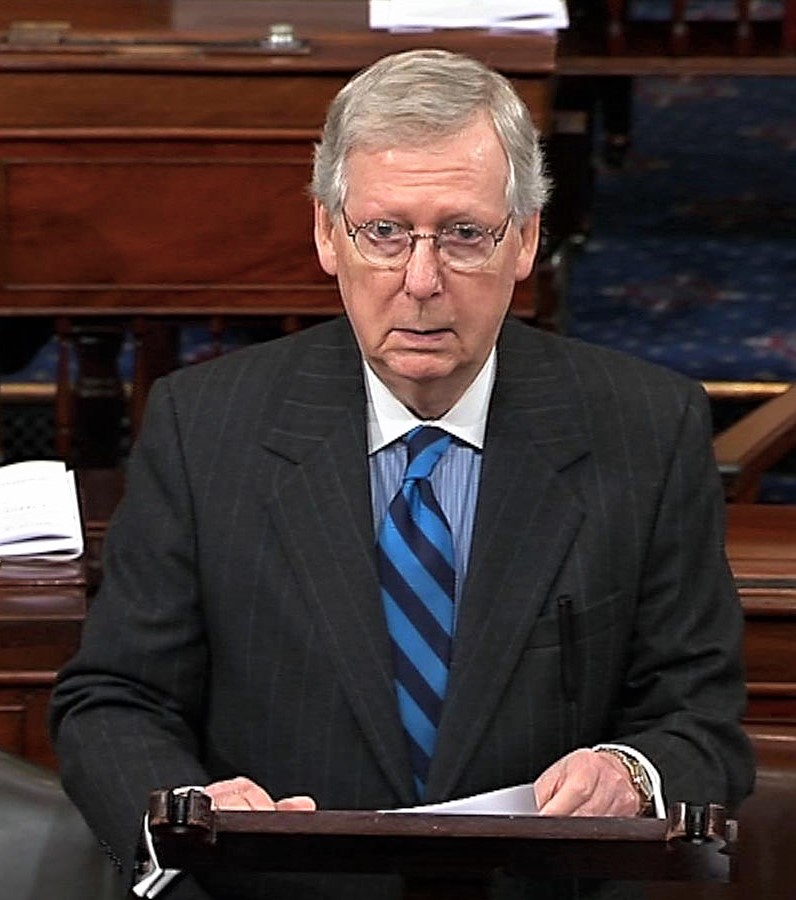
In our last episode, Mitch McConnell, (you remember him, he’s the one in the pinstriped suit and the clueless look playing the part of the Senate Majority Leader), was bringing two bills to the floor of the U.S. Senate (that’s the chamber of Congress where serious reflection and decision-making takes place), to reflect and decide on two very different plans.
Plan One (aka Trump’s plan): would appropriate $5.7 billion taxpayer dollars to build a wall, steel slats, whatever, along vulnerable parts of the southern border, ostensibly to stop crime, illegal aliens, drugs, oh, and Middle Eastern terrorists from entering our country.
Plan Two (aka The Democrat’s plan): re-open the federal government allowing those originally deemed as “non-essential” workers, as well as essential workers (who have to work without pay) – like the FBI, Coast Guard, Air Traffic Controllers, TSA workers, oh and Border agents, all of whom are responsible for keeping illegal drugs, crime and terrorists out of the country – for two weeks while congressional leadership argues, excuse me, negotiates a permanent solution to a “crisis of the soul” as President Trump puts it, at the southern border.
Both plans failed to meet the 60-vote threshold needed to be enacted.
Now what?
“Senator Lindsey Graham,” The New York Times reports (Jan. 24), “Republican of South Carolina, announced on the Senate floor that he had spoken with the president, who had said he would be open to a three-week stopgap measure to reopen the government and provide time for a broader border security deal, as long as it included some of his priorities.”
What are those “priorities”? A substantial down payment for his wall.
While McConnell and Senate Minority Leader Chuck Schumer retreat to a room to discuss a compromise solution, the rest of us all waited around for another piece of Breaking News, (or commercial break) as to who’s going to blink, bend or Tweet out the next bit of bluster, bombast or Bull$#@.
Meanwhile, Commerce Secretary and billionaire Wilbur Ross can’t understand why more than 800,000 furloughed federal workers are going to food banks and homeless shelters. His suggestion: go to your local bank or union and take out a loan to get by.
At the same time Trump’s daughter-in-law and billionaire Lara explains in an interview that furloughed or working without pay workers are experiencing a “little bit of pain” for the “future of our country.”
Both responses belong in their pitch for a co-authored book, Trump Administration Strategies for Furloughed Federal Workers by Dummies.
What stood out to me in all this chaos are two common rationalizations which justify unethical conduct as pointed out by ethicist Michael Josephson:
It’s Okay If I Don’t Personally Gain –
“This justifies improper conduct done for others or for institutional purposes on the false assumption that personal gain is the only test of impropriety.”
While congressional leaders may not have a direct financial stake in the outcome in keeping the government shuttered, they are clearly putting more than 800,000 individuals and their families in hardship positions not to mention compromising the safety and security of a country they claim to defend by maintaining the president’s notion of allocating $5.7 billion for a wall.
All of this is for gain… political gain.
If It’s Necessary, It’s Ethical –
“This rationalization is based on the false assumption that necessity breeds propriety,” Josephson explains. “As Nietzsche once wrote, ‘necessity is an interpretation, not a fact.’ ”
This is part of the central rational of President Trump. Despite facts and figures from his own government agencies, most illegal drugs enter the country through legal ports of entry. Most of the illegal immigrant population comes from individuals who over-stay their visas, according to NPR (Jan. 20).
The other part of Trump’s use of this rationalization is simpler: it was his central campaign promise to his “base” of voters. After Trump agreed to legislation on a budget that did not include money for his so-called wall, he backed out of signing after receiving withering criticism from Ann Coulter and Rush Limbaugh (the two conservative pundit actors in this season’s episode).
When faced with the “false necessity trap,” Josephson asks us to look at the goal and the means:
“Is the goal truly necessary? What would you do if you knew you couldn’t get what you want? Would a disinterested outsider believe the goal was necessary? Would you do it if you knew the goal was a ‘want’ rather than a ‘need’?”
“Are the specific means you are considering truly necessary to achieve your goal? What would you do if those means were unavailable? Would a disinterested outside think the conduct is necessary to achieve the goal? Will the means jeopardize or change the nature of the goal?”
Those are the questions congressional leaders need to seriously examine in reaching an effective bipartisan decision.
Oh, and the lives of more than 800,000 federal workers and their families.
Comments










